JAMIE ETHERIDGE
★ ★ ★ ★
FICTION
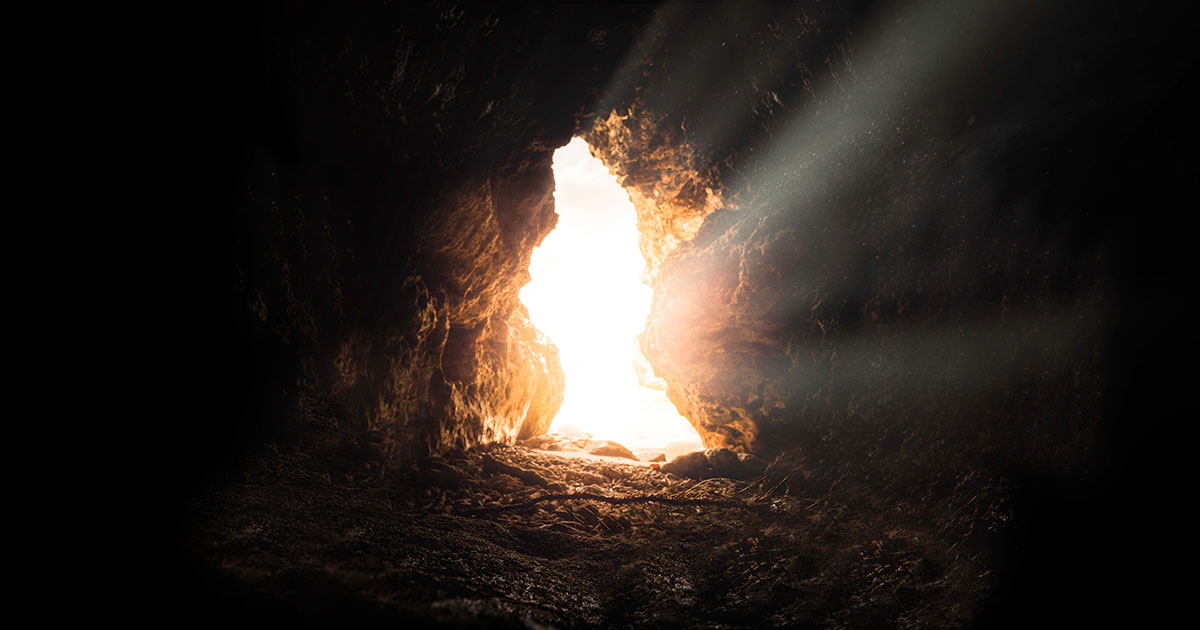
Vacuum
It starts with the rain. The long quiet, an unquiet like nothing I’ve heard before, like a vacuum opened up in the air around us. At first the rain muffles the absence of sound but then like a hole ripped into the fabric of the night, I hear it.
I try to tell Nancy and the others but they laugh and joke – at least at first. Later when everyone hears it – or unhears it, rather – I will be blamed.
The absence of noise is a strange thing, eerie and frightening. But also entrancing.
I follow it.
Away from the camp fire and Nancy’s warm body snuggled up against mine.
I follow it into the trees, like you might follow the sound of music down a street to find the party where its coming from.
It is dark and quiet – so quiet I can hear my breath, dragging in and out of my throat, across my tongue, between my nostrils and into the vacuum. Much less comes back then leaves.
I follow it up the mountainside, weaving in between the trees, following an old hiking trail, almost to the summit and just for a second, it disappears. I stand on a rock outcropping in a bowl-shaped clearing, looking out across the scenery. The bright, full moon lights up the national park like a late-night baseball game, the diamond lit by torches strategically distanced. The no sound wavered, danced and then was gone.
I could smell the pines then. Their fresh, ripe scent mixed with the gooey, sweet sap and the rich earth of the forest floor. I sat down, looking across the well-lit space and found it, a giant black hole carved into the hillside just opposite me.
That’s where the sound went. I knew it before I even saw the cave’s mouth.
I sit there until sunrise, watching the darkness above me evaporate, sucked into the hole in the hillside. Then I rise and walk back to camp, through the lanky pines. The trees sway in the morning wind, gentle and reassuring.
“Where you been?” Nancy asks. She squats by the camp fire, sizzling bacon in a cast iron pan. “I thought you got lost.”
“No. Only high,” I say by way of explanation. I strip off my t-shirt, damp with the morning dew and go into our tent, lay down on the sleeping bags, can’t sleep, get up and go back out to the fire. Two other campers, Noel and John, have joined Nancy. They drink coffee from a tin pot someone had set on warm coals at the edge of the fire.
“Morning,” John says and Noel looks up and smiles. I smile back.
“Morning.”
“What happened last night, Ben? You took off, through the woods. We were worried, man. No one goes alone after dark,” John, tall and muscled, runs the camp. He speaks and walks like military, ex-army or ex-marine. Tattoos on his forearms of devils with pitch forks and harem girls suggest biker but I don’t ask. He keeps the camp running, organizing supplies and keeps an eye out for the campers.
“The weed, man. Got to me. I heard something, followed it. Sat on a rock till dawn, walked back.”
“Yeah, ok but don’t do it again, huh? You get lost, we gotta call the forest service and then this whole set up is done.”
“Yeah, got it.” I ached to say more or to push back. This place was offgriders, those who fished and hunted and wanted no part of modern society. It was supposed to be without ‘authority’ but I knew John was right. Anyone lost or hurt here meant the place would be known, the people questioned. I had nothing to hide, a few joints in my pocket, a few too many fish heads and no fishing license, but nothing that would lead to jail. Others in the group, I wasn’t so sure.
There is a dozen of us, with people coming and going fairly regularly. No one stays too long except John and a few of his buddies. The rest are just passing through, a few days, weeks and then they move on across the border up into Canada or back into the towns at the foot of the mountains.
All day I listen but hear nothing or rather, nothing out of the ordinary. After a nap and lunch, we swim in the icy river. Even in mid-summer, the forest is cool and the river cold enough to freeze your balls off. I sink to the sandy bottom, closing my eyes and listening to the sounds below the surface. Usually this is the most quiet I can find but now the hole in the hillside makes this seem a cacophony. I listen as the water rushes by, as the others swim and splash, as the vibrations of sound swirl past me.
That night we sit around the fire, drum circle beats reverberating through the trees and across the forest floor. The vibe in the camp is good, positive and calm. Some of the campers plan to leave after the weekend. I don’t mind. I don’t even know what day it is. Nancy and I eat fish we caught earlier and a few joints are passed around. I forget about the hole in the hillside.
Around 3am, something wakes me. Inside our tent, Nancy and I lay naked in one of our two sleeping bags. I slide out of it, careful not to wake her, slip on jeans, t-shirt and my only pair of hiking boots.
In the camp, all is quiet, most of the campers sleep in tents but a few have laid rolls near the fire, staking out spots they hold for days at a time. I walk out of the camp, through the trees and follow the moonlit trail up the mountainside.
The vacuum beckons.
* * *
Silence is necessary. It has largely disappeared from the modern world and that’s why, in my opinion, you find greater levels of drug use and abuse, anxiety and depression. Everywhere you look, be it Spokane, Seoul or Sarajevo, humanity is bombarded with noise. We create it, we revel in it, we surround ourselves with it.
But when it gets too much, we seek out the woods, the beach, the places not yet fully inhabited, not yet overrun by technology, by humanity.
Hence Metaline camp. Half an hour up the side of a mountain, tucked into the treeline near a bend in the Columbia River, the camp is named after the closet town, Metaline, though its mostly just called camp. The campers come to escape the chaos and some stay, dropping out completely, while others are just taking a breather before diving back into the torrent of modern life.
I reach the hillside and sit, staring into the mouth of the cave, waiting.
Nothing happens.
Then as the sky lightens, I begin to notice. Pacific dogwood, cottonwoods and red birch trees surround the mouth of the cave, creating a shadowed entranceway that throws lattice patterns on the ground as the sun rises.
A waterfall, more a trickle than a stream, pours noiselessly from the hillside. The sunlight reflects off the falling water, washing the rocks and crags in rainbows.
Birds perch in the dogwood, causing the white petals to float to the ground each time they land or take off from a branch. They do not sing or even chirp, but just sit, eerily quiet, twitching their heads back and forth, as if waiting for a signal.
I close my eyes. Wait.
At first, I hear the forest sounds. The wind moving through the tree branches and leaves high in the canopy. The rustle of small forest animals in the earth. There are coos from what may be an owl somewhere behind me and I imagine the bird, perched and watching.
Then slowly, so slowly that I hardly notice at first, the silence returns. It creeps forward out of the cave like a raccoon or Douglas squirrel, nudging its way toward an acorn in the middle of a clearing, moving slowly, cautiously.
The vacuum envelops me, the trees and the birds. We sway in the quiet. I let out a long, low sigh and can feel the tension leaking from my body.
I float above myself, looking down into the pitch black of the cave where nothing stares back at me. Silence.
* * *
I don’t know how long I sit there. An hour, a day?
Then Nancy breaks through the trees at the edge of the clearing, sits down next to me on the shelf of rock. She’s brought a sandwich, some water and some weed. I take the water, drink it down but pass on the food and ignore the joint. Somehow, I want neither. This is the first time in maybe two years that I haven’t been high all day.
Nancy hesitates. She sits on the rock, one leg thrown over the other, swinging her feet. She feels it too, the silence. At first when she sat down, I heard her breathing and the noise rose cacophonous across the rocks. She started to speak, asking me something but the words fell like rubber to the ground, bouncing against the rocks and away into the hush of the trees.
Now she sits and says nothing, cocooned in her own blanket of silence.
I drop back down into my own quiet, companionably next to her. We don’t speak, and the hours drift by like gentle white clouds in a summer sky.
That night, Nancy tells the others. She calls its ‘zen’ and talks about meditation and mindfulness. I didn’t feel any of that, didn’t find any of those facile and plastic-y words in the quiet on the mountainside, but I say nothing. Instead, I drink coffee by the fire and then go to my tent to sleep.
* * *
The next morning, I leave for the cave and am surprised to find several of the other campers following me. Nancy brings water and a blanket and some of the others do too. They walk single file, following me up the mountain trail. I listen to their early morning talk, some whisper and some don’t, discussing the cave and the silence. Most of them haven’t heard it, can’t comprehend what it means. But they come anyway, eager for a diversion from the slow pace of camp or just curious.
I take my usual place on the rock outcropping, facing the cave and sit.
Nancy sits beside me.
The others file in after me, choosing spots to the left or right of where I sit. Some whisper as they walk into the clearing but stop as they move past the last of the trees. Even the sounds of their shoes on the ground are muffled, almost inaudible.
The day passes.
At some point, maybe midafternoon, it rains. The sky greys over, an old man yawning, and down comes the rain at first in a trickle than in fat, warm plops on my head and bare arms. The rain grows stronger, wind whipping it down the mountain pass, across our little clearing. The rain is loud, groaning, the anguish of the earth as it weeps for what I can only imagine. I weep with it, letting my tears mix with the rain, the drops running down my cheeks, solace for hurts unhealed.
In the rain, I remember my mother. Her voice like silk in the mornings when she’d gently wake me for school. “Benjamin, my sweet,” she’d say and kiss my forehead and cheeks. The cancer took her so fast I never had a chance to say goodbye. “What springs from earth dissolves to earth again, and heaven-born things fly to their native seat,” wrote Marcus Aurelius. She rests above, I am certain. Twelve years later and I still wake thinking of her nearly every morning.
* * *
That night, John asks me what’s going on. He’s curious about the cave, the ‘vigil’ as he calls it.
“You doing acid, man? Cause we don’t like that shit here.”
“Nothing. I am just sitting. It’s quiet,” I want to explain but I also don’t want to. John is a black and white kind of guy. Coffee is hot or cold, never warm. He runs the camp, keeps everyone safe. But he’s not as laidback as he pretends to be. There is more, something he’s hiding. The search of our stuff when we came was straightforward, calm. But it was like he was looking for something specific. Even his questions were pointed, who were we, how did we hear about the camp, how long had we been together, what route did we come by?
Nancy and I had been together six months by then, traveling through the national forests up and down the western seaboard, camping wherever we liked. We’d met in San Francisco at a music fest but I knew at some point, I’d have to work my way back up to Spokane, where my father still lived. Then Nancy heard about this place, a camp further north but cool and chill.
John welcomed us, introduced us around. He explained the rules—no guns, no drugs—except legal weed which pretty much everyone has these days—and no fighting.
We’re not planning to stay long but three weeks later, we’re still here. Nancy likes the community and I enjoy the fishing, the river. We stay with no definite plans, only a vague notion that as the cooler weather approaches, maybe late September, we’ll move back down the mountain, winter in Spokane with my dad before hitting the road again.
At least that was my plan.
Nancy never asks. She prefers to just go with the flow, wherever that leads. In the months we’ve been together, she talks a lot about chi and energy, smokes up all day and chills. She likes wildflowers in her hair and swims naked in the river. She reminded me of my mom when we first met, the same brown river of hair tumbling to her waist, the same willowly look in her eye. But later I realize it’s the dope, she’s stoned pretty much all day. Still she wears red lipstick constantly, the imprint of her mouth on every shared joint and has never told me her last name.
In the clearing, she shudders with the rain. She’s soaked through and a rivulet of water runs from her head, down her long hair, tied back into a pony tail, and onto her back. She’s wearing only shorts and a thin t-shirt. I want to comfort her, to put an arm around her and still her. But something holds me back. After some time, she gets up and walks away. Wet leaves from the rocks and the clearing floor stick to her sneakers and the backs of her legs.
That night in camp, she’s sitting on the other side of the fire instead of next to me. I want to ask if she’s upset but instead, I drink coffee, smoke my last joint and watch the flames. Around us, the other campers talk excitedly about the day spent by the cave. At least four or five them stayed the whole day, a few others showed up in the afternoon, sat till the sun dipped below the horizon and we all descended as a group back to camp.
The next morning four new campers show up. They bring sleeping bags but no tents and they follow the trail into the woods and up the mountainside, walking into the clearing laughing and joking.
I’m at my rock, sitting and watching the cave when they break through the last of the trees. The two in front, a guy and girl in their mid-twenties look around and their voices die out, they stop, startled for a moment by the silence. I can feel it, their energy rushing from their bodies and toward the mouth of the cave. They drop their bags, quietly, and find spots to sit. The two behind do the same.
Today the silence is warmer. There are more people in the clearing and I expect movement, fidgeting, coughs, the normal behavior of human beings in a crowd. But instead the collective energy warms us all and when the rain comes, it is soft and warm and drops like gentle taps on our heads and bodies.
I stand up, swaying in the rain with the breeze and the others around me do the same. We dance, noiselessly and slowly, with the rain. I close my eyes and feel the silence. It is close and warm, comforting. It has a smell too, like the earth in the cool forest floor after a rain shower.
The newcomers remain the entire day. I only notice when the sun starts to set that Nancy did not come today.
* * *
The camp has grown crowded, three dozen or so campers now and more are showing up every day. John is edgy, trying to keep order, keeping an eye on the trail that leads down the mountain to the road. I watch him from the fireside, wonder what he’s worried over. Nancy has moved out of my tent, into the one with John and Noel. She won’t speak to me when I try to talk to her.
“Ben, I want to talk with you,” John approaches. He rocks back and forth on the balls of his feet as I stand up from the camp fire and then turns and walks to the edge of the camp, behind his own tent, so no one will hear us.
“Listen man, this cave vigil you’re doing has got to stop. People keep showing up, talking about it and more and more are coming every day. Pretty soon cops will be nosing around, asking who we are and why we’re all gathered here.”
“I’m not doing anything,” I tell him. “I didn’t ask anyone to come. I haven’t said a word about it.”
“I know that, man. I know you’re cool. But word is spreading, yeah? And it’s got to stop. No more vigil ok? Just go to the river, swim or whatever but don’t go up to that cave. Got it?”
“What are you saying, John? That I have to leave? I can’t stay here if I go to the cave?”
“No way. It’s not like that but yeah, no more cave, I mean it. Enough already.” he spins away, a ball of energy pinging around the camp. He’s at the fireside and then checking the tents, he’s talking to all the new campers, asking questions, asking names.
I wait till the camp sleeps, late into the night and pack my roll and tent and leave.
The path up the mountainside has widened, trodden down by the growing numbers of people, so I have no problem following it, though the moon has passed into a crescent phase and there’s little light.
When I reach the clearing, I leave the tent at the edge and take only my sleeping bag with me to the rock outcropping. I unroll it and lay down. Above me, a slice of night sky can be seen through the canopy of forest and I am dazzled by the brilliance of the stars. The sky’s quiet melds with the silence on the mountainside until the seam disappears and we are one. No sound permeates and I am wrapped in the cocoon of silence.
I sleep.
* * *
The people show up in droves, too many to count and now they have to take turns, the clearing so full there are no places left to sit. Folks from the town at the base of the mountain are coming too, curious to know what all the fuss is about. Some bring their children—a day trip to see the hippies—and suddenly I see cameras and mobile phones, flashes of light as people lean into the mouth of the cave to take photos.
Children run around the clearing, some of them stop and stare at the cave. One girl, maybe eight or nine wearing pigtails, a pink hoody and shorts, walks right up to me and cups my face with her palm. Her skin is silky soft, the gesture so gentle, I want to cry. She looks me right in the eyes.
Then she turns and goes to sit on the ground in front of me, between me and the cave. People make space for her and she scoots on her butt to get a bit closer, the black hole gapes back at her. She sits there for hours, unmoving.
Someone must have taken a photo because this is the image that ends up in the newspaper, the cave, the girl and me, all in a line, the sweep of the trees and mountainside around us, the others in the clearing out of focus.
That’s when the flood gates open.
I live at the cave’s mouth, sleeping, eat and leaving only to use a forest latrine someone has dug behind the back of the clearing. When food appears at my side, I eat. Sometimes someone will leave a bottle or water or a coffee and I drink. Otherwise, I do not move.
But there is constant motion around me. Whirling, turning and twisting. A steady stream of people roaring past, like the flood on Fifth Avenue at the five o’clock rush hour. People move in and out of the clearing, in and out of the silence.
There are cameras and journalists and TV crews. No one stays after dark but me and I sit in the day’s quiet waiting for the silence that is to come with night.
John, Noel and Nancy have split. They disappeared from the camp one night, the tents packed and gone. One of the other campers tells me when he shows me the newspaper. He’s angry, waving the paper in my face and yelling but I can hardly hear what he says. The sounds of his words drop from his mouth and bounce around my feet. The man, a friend of John’s from the camp’s early days, rears back as if to hit me but others move in and lead him away.
I remain, unmoving, in my seat and watch the hole in the mountainside. The darkness has lately changed. It shimmies and vibrates with the energy of so many people moving in and out of the clearing. It absorbs their sounds. The silence widens further, engulfing me so that I start to lose other sensations. I can still see but my sight is blurred, as if tears cloud my eyes. I drink coffee and it has no taste, or maybe its water warmed by the sun. I forget to look into the cup when I drink.
More people come and now they seem like colored leaves moving across my line of sight. I cannot hear them, cannot feel them except as a blur of movement. I have stopped eating completely, only sipping the liquids placed near me.
I lay down on the rock and sleep and in my dream, I’m above the clearing, floating in the night sky and running among the stars, rounding their bases like when I was in Little League.
Then I open my eyes and it is night. The clearing is empty, though blankets have been left here and there and I can see a plastic bag, dropped at the trailhead. I stand and stretch, feel the warmth of my muscles as they move beneath my skin.
The silence is all encompassing and even the light, low and humble, vibrates around me in casual waves. It wavers as I walk toward the cave. The silence, it has been waiting too, beckoning. I pause at the entrance, look into the darkness, the tranquil stillness, then step inside.
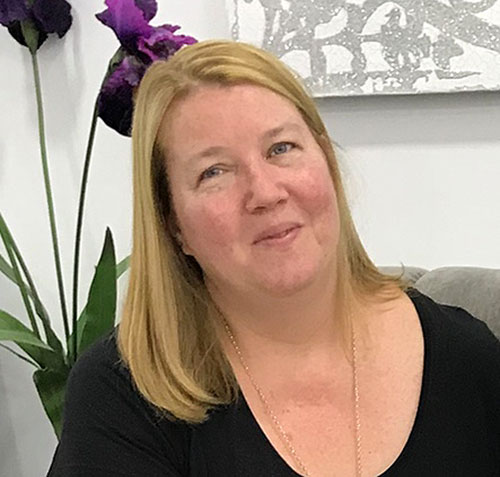
Jamie Etheridge is an American writer and journalist currently living in Kuwait. Her poetry has appeared in Red River Review, The Potomac Journal and Unblinking Eye. In Spring 2017, she won the Ink & Paint competition by the Kuwait Poets Society / Artspace for her poem, ‘Epithet’. Another poem won Honorable Mention in the Goodreads January 2017 newsletter. Her first short fiction piece, ‘Alphabet Rain’, was featured in Wordhaus in March 2016 and her second story, ‘Lemonade and jinn’ will be published in Running Wild Press Anthology Vol. 4 (forthcoming, summer 2020).



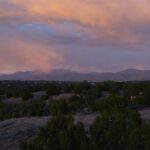
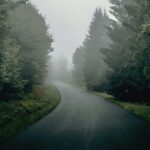
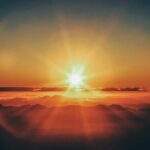

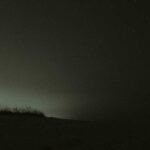

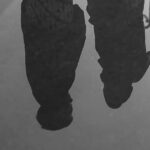


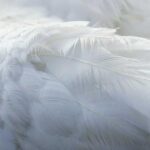

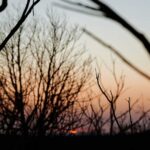



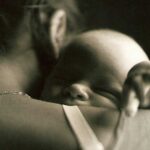
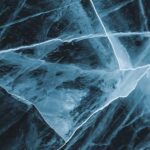
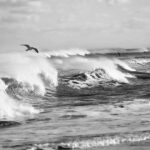

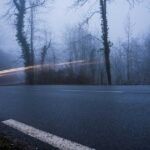
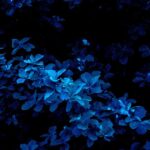
0 Comments